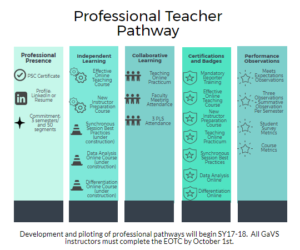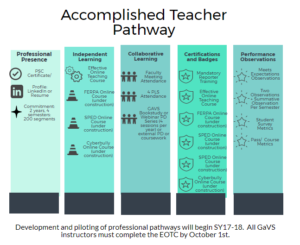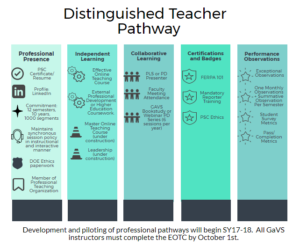Georgia Virtual is embarking on establishing a new learning environment for teachers and staff to reflect the values of rigor, flexibility, and quality that have guided our student course offerings. This initiative will eventually include professional learning opportunities for educators and employees across the state. Building on our experiences with badging, digital credentials and teacher training, Georgia Virtual will begin offering learning pathways – tracks with multiple options for learning styles, professional interests, and the program’s strategic needs.
Several years ago, Georgia Virtual evaluated the professional development provided to new online teachers and found that the model was both extensive and effective, but expensive. Like many online programs, onboarding new teachers is a lengthy process where candidates learn the principles of quality online teaching, train in the nuts and bolts of systems, and have a mentored experience before finally instructing a class. This preparation often took two semesters. Some educators expect online learning to be a simple extension of the physical classroom. Too many would persevere through the complete, but costly, training and then resign after, or even during, their first semester. A cost analysis of training new online teachers led to the decision to develop a free, open course – Effective Online Teaching. This course provides the requisite basic knowledge and skills to be a successful online teacher. Candidates are required to complete the course before applying for a position with GaV.
Following research on microcredentialing, the Effective Online Teaching course was designed to provide two sets of badges signifying separate levels of achievement. Our dedication to Open Education Resources led to the notion of keeping the content open and available for anyone to complete and earn self-awarded badges. These badges are a viable marker for activity and are often sufficient, especially when the course is completed with a cohort. However, the hiring process dictated a verifiable credential to replace a section of the previous training. The verified badges for the Effective Online Training course have become a prerequisite credential, on par with a state teaching certificate. Over 400 educators have earned the verified badge issued through Credly, including all GaVS faculty.
Wanting to assure that any badge provided through our program was universally accepted on social media sites and easily integrated into teacher portfolios, program representatives attended the IMS Global Summit. Our attendees focused solely on a thread of presentations dedicated to digital credentials and standards for issuing badges. Besides the numerous specific takeaways, our general impression was that badging, digital transcripts, and competency-based learning are all coalescing into a viable ecosystem for professional learning.
For the Georgia Virtual program, 2017-2018 is a development year for the new learning pathways. In this design, every educator will be placed on one of three pathways: Professional, Accomplished, and Distinguished. Initially, teachers are assigned based on experience and achievement. The pathways will help determine support levels, including targeted mentoring, classroom observations, and suggested professional development options.
The Professional pathway assembles all the new online teacher induction process. The graphic below offers a mockup of the steps our instructors will take along the way.

Completing the Professional pathway allows teachers to share a collective base knowledge and set of skills. Teachers that progress to the Accomplished pathway will focus more advanced skills and offer more individual choice in honing their expertise. For instance, the FERPA course for Professional Teachers will focus on compliance, whereas the Accomplished FERPA course will focus on tools to comply with FERPA, but share information. The Accomplished level will also indicate opportunities for presenting skills and tools. This pathway will also open mentoring and certain leadership positions within the program. The notion of branching out is critical to the top two pathways. Teachers will share a collective base knowledge and set of skills, but they will decide on the specific credentials to acquire. Mirroring the differentiation we provide for our students, providing instructors with personalized professional learning options is critical to the top two pathways.

The Distinguished Teacher pathway will acknowledge commitment, experience, and achievement. This pathway will also serve as an endorsement in leadership as well as offer independence to teachers that want to pursue outside opportunities. The focus for this pathway will be advanced skills and sharing expertise.

As the learning pathways develop and new professional learning opportunities are created, Georgia Virtual is incorporating the QM Higher Education rubric into the development to meet the needs of adult online learners. The Professional Pathway will encompass the necessary tools for new online teachers. The pathways beyond Professional will incorporate outside professional learning experiences into this ecosystem. The goal is to have dynamic interface for every teacher to recognize their progress and the opportunities available.
Building on the success of badges and digital credentials, Georgia Virtual is hoping to take a few steps forward by a creating a systematic ecosystem of professional learning. This initiative will continue to focus on the onboarding of new teachers, but expand to provide meaningful opportunities for instructors to grow and innovate in their online or blended classrooms.
Submitted by Richard Copeland, Supervisor of Teacher Quality, Georgia Virtual

